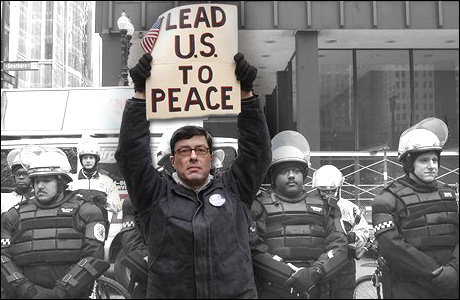READ
The Suicide -- or Murder -- of a Clinton-Hater Hater

|
|
 |

(PNS) --
Sixteen
years at ago at the start of the Gulf War, a young man set himself on fire here in San Francisco. Next to his charred remains, the police found of copy of Bartlett's Familiar Quotations and a few anti-war pamphlets.
A few months after a young student of University of Amherst, Massachusetts, followed suit. He poured flammable liquid on himself in the middle of the town square, lit a match, then another, and turned into a ball of fire. It was reported that he died screaming even as he refused help. He left behind a cardboard peace sign with his driver's license taped to the back and, curiously, a small white Buddha.
In early November, as the Iraq war raged on, another person set himself on fire in Chicago, again drawing little media attention. In his suicide note, Malachi Ritscher, a man in his early 50s, wrote that his fellow Americans had become "more concerned with sports on television and ring-tones on cell phones than the future of the world." He set himself on fire on Chicago's Kennedy expressway, but his terrifying light didn't catch much media attention.
|
|
|
What to make of such an act of protest? The few newspapers that reported it called it suicide. But is there another way to look at self-immolation? Is it an act of heroism or madness?
More than four decades ago, a Vietnamese Buddhist monk named Thich Quang Duc, in order to save his Buddhist compatriots from oppression and false arrests, introduced this form of protest to the world in the middle of downtown Saigon. Images of him sitting serenely inside the ferocious fire captured our imagination. Some said his death eventually toppled the Diem regime in South Vietnam.
In the East, the Buddhist monk's sacrifice suggests a sound mind and body. Unflinching in the flame till the end, he reminds us that that the world is but an illusion. Combined with an altruistic motivation, a very great compassion for other suffering living beings, his act is oddly life affirming. He gives his own to call the world's attention to the oppressed and tortured, to honor others' lives.
But America still does not know what to make of such an act in its own backyard. Four Americans set themselves on fire during the Vietnam War. Three in the Gulf War did it, and now one more in the Iraq war. In reading the troubled biographies of these sometimes depressed, loners and self immolators, can we distinguish the psychologically damaged from the saints?
There's no easy answer, but clues may be found in the method in which they use to leave this world. Fire, this gift and curse to humanity, is a terrifying beauty. It can devour as much as create. Contained, fire hints of elegance, cooks our food, engines our world. Out of control, it engulfs cities, bodies, and souls. It seduces. It overpowers. And it destroys.
In the 20th century, the West found a spring that holds its source -- in the form of oil pockets, mostly in the Middle East. This same liquid flame, harnessed through internal combustion engines, may quicken death even while it provides the foundation of our modern, highly mobile life.
Those who protest wars by choosing to die by fire seem to know something of this. In the Gulf war, the two young men who committed the ultimate act of war protest, denounced the car. One walked for miles instead of driving. The other abandoned his driver's license.
Malachi Ritscher left a sign by his remains that said: "Thou shall not kill." And on his website, he explained: "If I am required to pay for your barbaric war, I choose not to live in your world."
Buddhists suggest that death is but a transformative stage. Death by fire gives death a transcendental clarity. Shamanists tell us blood sacrifices appease the gods, bring down rain, pacify restless spirits. And on some lonesome mythical hill, Prometheus bemoans the enormous price we mortals must pay for what we dare possess.
The self-immolators seem to carry the emotional baggage of the entire society, even if society largely ignores their stories. Within the anti-war movement, their form of protest nevertheless intones a disturbing and arresting note. Their bodies, set ablaze, become foreboding beacons of our age.
Comments? Send a letter to the editor.Albion Monitor November
30, 2006 (http://www.albionmonitor.com)All Rights Reserved. Contact rights@monitor.net for permission to use in any format. |
|









